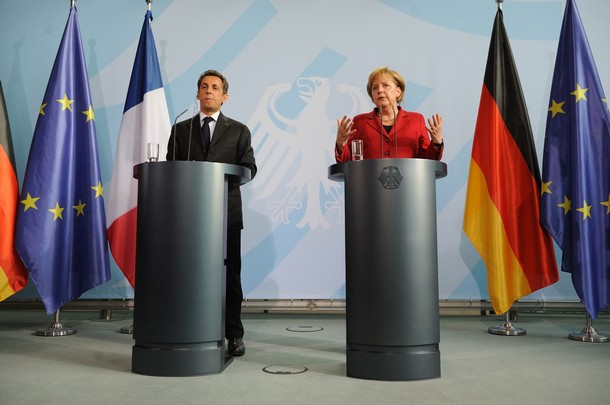
From Steven Erlanger, the New York Times: The market storm over the fate of the euro has calmed to prevailing winds, but there is considerable nervousness here over the economic health of Spain, the impact of austerity on long-term growth and continuing differences between France and Germany over the economic direction of the European Union. …
Both President Nicolas Sarkozy of France and Chancellor Angela Merkel of Germany are weakened by the financial crisis and public unhappiness, and both are maneuvering for their economic conceptions of Europe. Mrs. Merkel is demanding stability, fiscal rigor and a European Central Bank that focuses on keeping inflation low, while Mr. Sarkozy favors looser discipline, with room for stimulus spending and more concentration on promoting economic growth. …
At each crisis, usually after German hesitation, the two have found a compromise, as they did at the last summit meeting in mid-June. But both leaders are increasingly unpopular, with Mr. Sarkozy battling ministerial scandals and Mrs. Merkel just managing to force through her choice for the ceremonial German presidency.
The two leaders are pulled in different directions by their electorates. The Germans do not want to finance others in Europe and demand austerity, while the French are unhappy about pension reform and coming, if still vague, budget cuts. …
In addition to their differences over growth policies, Mr. Sarkozy wants an “economic government” of the European Union to coordinate fiscal policies at the level of the 16 nations of the euro zone, the better to put pressure the European Central Bank to be more flexible on interest rates. Mrs. Merkel has accepted the French terminology of economic government but insists that it include all 27 members of the European Union, to water down French influence.
Mr. Sarkozy wants the economic government to have its own secretariat, which Mrs. Merkel has so far managed to reject, while the Germans want harsh sanctions, including the possibility of expulsion from the euro zone, against nations that flagrantly break the rules.
At base, Germany wants the rest of Europe to behave as it does — pursuing policies of low inflation, nearly balanced budgets and export-led growth — and sees no reason to change. But France says that without more German consumption to accompany greater austerity and competitiveness from others, trade imbalances within the euro zone will sink it. (photo: Getty)
Image: getty%207%202%2010%20Angela%20Merkel%20Nicolas%20Sarkozy.jpg
